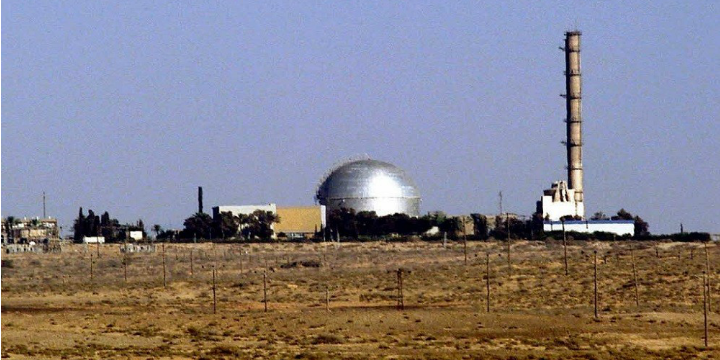Israel’s ‘Nuclear Ambiguity’ Under the Spotlight as 1967 War Commemorations Get Underway
 by Ben Cohen
by Ben Cohen


Israel’s nuclear reactor near Dimona. Photo: Wikimedia Commons.
As the fiftieth anniversary celebrations and commemorations of the 1967 Six-Day War get underway, Israel’s deliberate policy of ambiguity over whether it possesses nuclear weapons is increasingly being scrutinized by Middle East historians and policy experts.
Over the weekend, the New York Times ran an article detailing what it described as a “secret contingency plan, called a ‘doomsday operation'” that would have been executed in the event of an Israeli defeat in the war. The plan involved detonating a nuclear device atop a mountain in the Sinai Peninsula as a warning to Egyptian and other Arab forces, according to claims made by a former IDF Brigadier-General, Itzhak Yaakov. Yaakov, who died in 2013, made the assertion during a series of interviews with Avner Cohen, a noted Israeli expert on Israel’s nuclear program.
The revelations in the Times “certainly fit the pattern” of broader Israeli nuclear policy, Dr. Yoel Cohen — a professor at Ariel University and the author of a book about the Israeli nuclear spy, Mordechai Vanunu, entitled “The Whistleblower: Vanunu, Israel and the Bomb” — told The Algemeiner on Tuesday.
“The same thing happened in the 1973 war,” Cohen said. Citing research conducted in the late 1970s, Cohen said that on the fifth day of the Yom Kippur War, after Egyptian troops crossed the Suez Canal, Israeli “hints” about the existence of a nuclear option were delivered to the Egyptians through photographs taken by Soviet spy planes. Similar hints, Cohen said, were also made to the late former Iraqi dictator Saddam Hussein after his regime attacked Israel with Scud missiles — armed with conventional explosives — during the 1991 Gulf War.
The question mark over the existence, nature and extent of Israel’s nuclear strike capabilities was put in place as early as the 1950s, when France assisted the Jewish state in the construction of a nuclear plant near Dimona in the Negev Desert.
Cohen claimed that the desire to prevent an Israeli nuclear weapon was a key reason why the late Egyptian dictator Gamal Abdel Nasser went to war against Israel in 1967.
The persistence of the “nuclear ambiguity” doctrine, Cohen argued, is explained by Israel’s desire to maintain stable relations with the US, its closest ally, and one of only five states — along with Russia, France, China and the UK — to legally possess nuclear weapons.
In terms of the Middle East, Cohen said that current Israeli optimism about closer relations with Saudi Arabia and other Arab states in the context of the Iranian threat should not overlook the danger that these countries may also seek to develop independent nuclear capabilities.
 Amazon Pulls Book by Hamas Leader Yahya Sinwar Referencing Oct. 7 Attacks After UK Lawyers Intervene
Amazon Pulls Book by Hamas Leader Yahya Sinwar Referencing Oct. 7 Attacks After UK Lawyers Intervene Israeli Government Approves Increased Payments to Returned Gaza Hostages
Israeli Government Approves Increased Payments to Returned Gaza Hostages Tehran Signals No Retaliation Against Israel After Drones Attack Iran
Tehran Signals No Retaliation Against Israel After Drones Attack Iran US Stops UN From Recognizing a Palestinian State Through Membership
US Stops UN From Recognizing a Palestinian State Through Membership Jordan Reaffirms Commitment to Peace With Israel After Iran Attack, Says Ending Treaty Would Hurt Palestinians
Jordan Reaffirms Commitment to Peace With Israel After Iran Attack, Says Ending Treaty Would Hurt Palestinians ‘Crisis at Columbia’: Elite University Spirals Into Chaos Against Backdrop of School President’s DC Testimony
‘Crisis at Columbia’: Elite University Spirals Into Chaos Against Backdrop of School President’s DC Testimony ‘A Time for Vigilance’: FBI Director Says Agency on Alert for Threats Against Jewish Community During Passover
‘A Time for Vigilance’: FBI Director Says Agency on Alert for Threats Against Jewish Community During Passover New Haggadah Released for Israeli Soldiers in Gaza Ahead of Passover
New Haggadah Released for Israeli Soldiers in Gaza Ahead of Passover ADL Data Reveals Alarming Campus Antisemitism, Despite Strong Jewish Life
ADL Data Reveals Alarming Campus Antisemitism, Despite Strong Jewish Life



 Understanding the Meaning of Elijah This Passover
Understanding the Meaning of Elijah This Passover Tehran Signals No Retaliation Against Israel After Drones Attack Iran
Tehran Signals No Retaliation Against Israel After Drones Attack Iran New Play Opening in NY Recounts Verbatim Testimonies From Oct. 7 Survivors, Families of Victims
New Play Opening in NY Recounts Verbatim Testimonies From Oct. 7 Survivors, Families of Victims Israeli Government Approves Increased Payments to Returned Gaza Hostages
Israeli Government Approves Increased Payments to Returned Gaza Hostages UN Security Council to Vote Thursday on Palestinian UN Membership
UN Security Council to Vote Thursday on Palestinian UN Membership